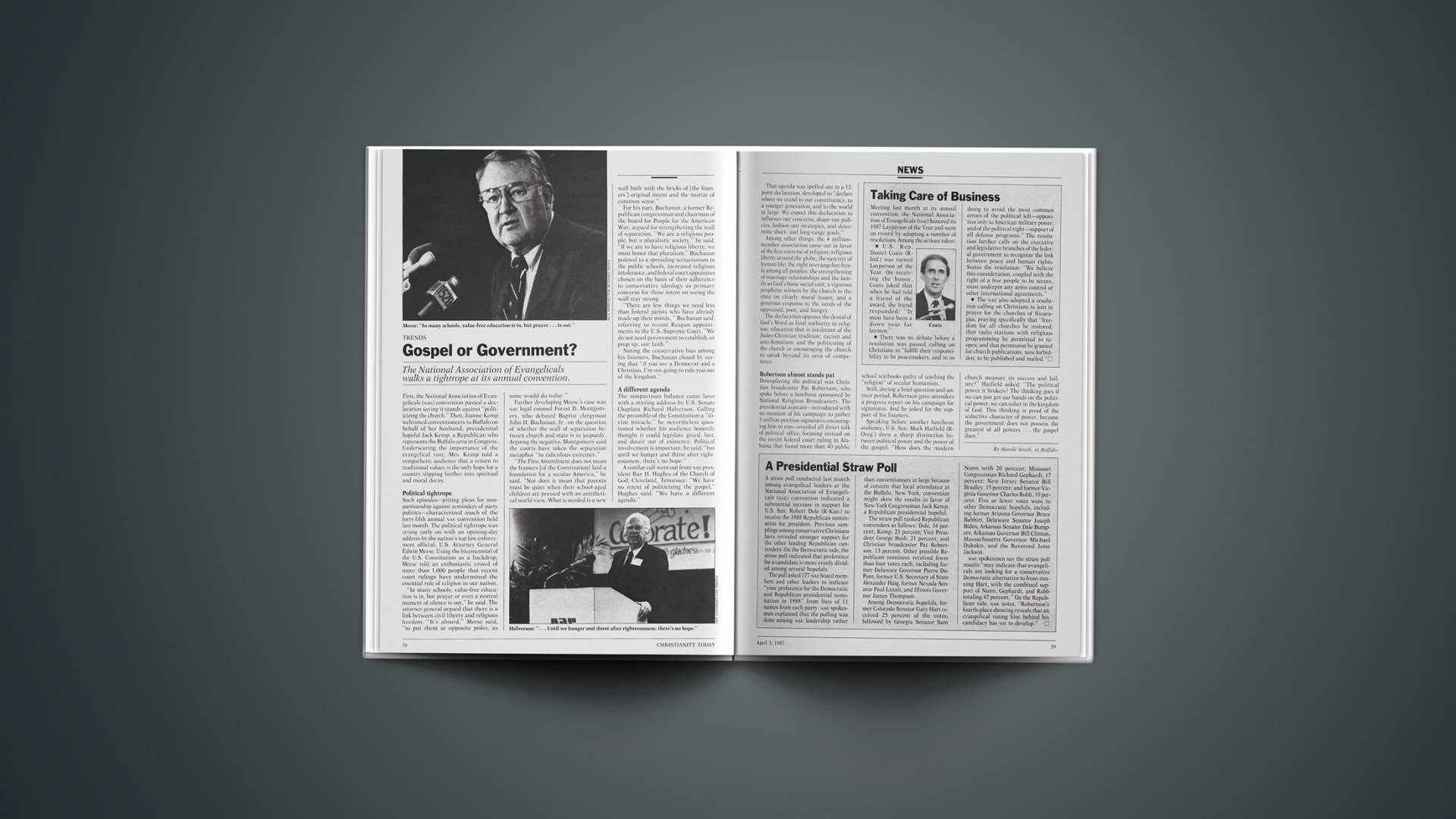First, the National Association of Evangelicals (NAE) convention passed a declaration saying it stands against “politicizing the church.” Then, Joanne Kemp welcomed conventioneers to Buffalo on behalf of her husband, presidential hopeful Jack Kemp, a Republican who represents the Buffalo area in Congress. Underscoring the importance of the evangelical vote, Mrs. Kemp told a sympathetic audience that a return to traditional values is the only hope for a country slipping further into spiritual and moral decay.
Political Tightrope
Such episodes—pitting pleas for non-partisanship against reminders of party politics—characterized much of the forty-fifth annual NAE convention held last month. The political tightrope was strung early on with an opening-day address by the nation’s top law enforcement official, U.S. Attorney General Edwin Meese. Using the bicentennial of the U.S. Constitution as a backdrop, Meese told an enthusiastic crowd of more than 1,000 people that recent court rulings have undermined the essential role of religion in our nation.
“In many schools, value-free education is in, but prayer or even a neutral moment of silence is out,” he said. The attorney general argued that there is a link between civil liberty and religious freedom. “It’s absurd,” Meese said, “to put them at opposite poles, as some would do today.”
Further developing Meese’s case was NAE legal counsel Forest D. Montgomery, who debated Baptist clergyman John H. Buchanan, Jr., on the question of whether the wall of separation between church and state is in jeopardy. Arguing the negative, Montgomery said the courts have taken the separation metaphor “to ridiculous extremes.”
“The First Amendment does not mean the framers [of the Constitution] laid a foundation for a secular America,” he said. “Nor does it mean that parents must be quiet when their school-aged children are pressed with an antithetical world view. What is needed is a new wall built with the bricks of [the framers’] original intent and the mortar of common sense.”
For his part, Buchanan, a former Republican congressman and chairman of the board for People for the American Way, argued for strengthening the wall of separation. “We are a religious people, but a pluralistic society,” he said. “If we are to have religious liberty, we must honor that pluralism.” Buchanan pointed to a spreading sectarianism in the public schools, increased religious intolerance, and federal court appointees chosen on the basis of their adherence to conservative ideology as primary concerns for those intent on seeing the wall stay strong.
“There are few things we need less than federal jurists who have already made up their minds,” Buchanan said, referring to recent Reagan appointments to the U.S. Supreme Court. “We do not need government to establish, or prop up, our faith.”
Noting the conservative bias among his listeners, Buchanan closed by saying that “if you are a Democrat and a Christian, I’m not going to rule you out of the kingdom.”
A Different Agenda
The nonpartisan balance came later with a stirring address by U.S. Senate Chaplain Richard Halverson. Calling the preamble of the Constitution a “divine miracle,” he nevertheless questioned whether his audience honestly thought it could legislate greed, lust, and deceit out of existence. Political involvement is important, he said, “but until we hunger and thirst after righteousness, there’s no hope.”
A similar call went out from NAE president Ray H. Hughes of the Church of God, Cleveland, Tennessee. “We have no intent of politicizing the gospel,” Hughes said. “We have a different agenda.”
That agenda was spelled out in a 12-point declaration, developed to “declare where we stand to our constituency, to a younger generation, and to the world at large. We expect this declaration to influence our concerns, shape our policies, fashion our strategies, course of eighteenth-and nineteenth-century revivals
Among other things, the 4 million-member association came out in favor of the free exercise of religion; religious liberty around the globe; the sanctity of human life; the right to evangelize freely among all peoples; the strengthening of marriage relationships and the family as God’s basic social unit; a vigorous prophetic witness by the church to the state on clearly moral issues; and a generous response to the needs of the oppressed, poor, and hungry.
The declaration opposes the denial of God’s Word as final authority in religion; education that is intolerant of the Judeo-Christian tradition; racism and anti-Semitism; and the politicizing of the church or encouraging the church to speak beyond its area of competence.
Robertson Almost Stands Pat
Downplaying the political was Christian broadcaster Pat Robertson, who spoke before a luncheon sponsored by National Religious Broadcasters. The presidential aspirant—introduced with no mention of his campaign to gather 3 million petition signatures encouraging him to run—avoided all direct talk of political office, focusing instead on the recent federal court ruling in Alabama that found more than 40 public school textbooks guilty of teaching the “religion” of secular humanism.
Still, during a brief question-and-answer period, Robertson gave attendees a progress report on his campaign for signatures. And he asked for the support of his listeners.
Speaking before another luncheon audience, U.S. Sen. Mark Hatfield (R-Oreg.) drew a sharp distinction between political power and the power of the gospel. “How does the modern church measure its success and failure?” Hatfield asked. “The political power it brokers? The thinking goes if we can just get our hands on the political power, we can usher in the kingdom of God. This thinking is proof of the seductive character of power, because the government does not possess the greatest of all powers … the gospel does.”
By Harold Smith, in Buffalo.










